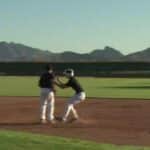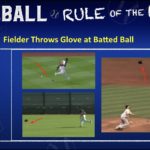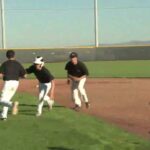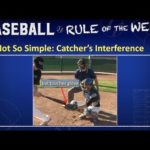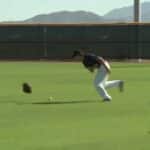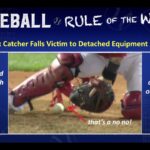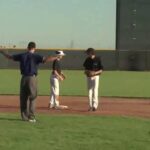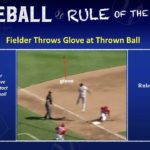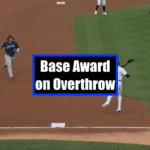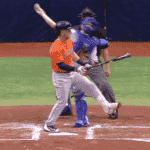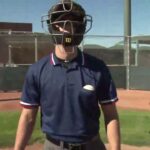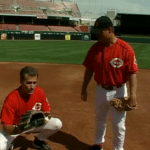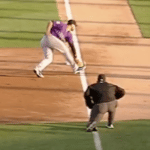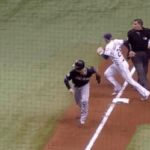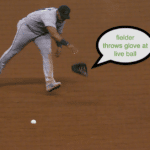Rule 8 – Section 3 – BASERUNNING AWARDS
| BASES AWARDED | BASE OCCUPIED TIME OF |
| ONE BASE (runners) | |
| 1. Balk | Infraction |
| 2. Pitch from pitcher’s plate thrown out of play | Pitch |
| 3. Throw from pitcher’s plate goes out of play | Throw |
| 4. Unintentional catch and carry | Pitch |
| 5. *Catcher obstruction (if attempting to advance) | Pitch |
| 6. Forced (because batter is awarded 1st base) | Pitch |
| 7. Pitch strikes runner | Pitch |
| ONE BASE (batter) | |
| 1. Walk | Pitch |
| 2. Pitch thrown out of play on ball four | Pitch |
| 3. *Batter is obstructed | Pitch |
| 4. Hit by pitch | Pitch |
| 5. Runner interference (unintentional) | Pitch |
| 6. Umpire interference (hit by batted ball) | Pitch |
| 7. Pitch lodges in defensive player’s or umpire’s uniform or equipment on ball four | Pitch |
| TWO BASES (batter and runners) | |
| 1. Fair batted ball bounces over, through, goes under, lodges in or under fence | Pitch |
| 2. #Fair batted ball or thrown ball lodges in defensive player’s or umpire’s uniform or equipment | Pitch |
| 3. *#Live thrown ball or pitch touched by illegal glove or mitt | Infraction |
| 4. *#Live thrown ball or pitch touched by detached player equipment which is thrown, tossed, kicked or held by fielder | Infraction |
| 5. First throw by infielder and ball goes out of play or lodged in or under fence | Pitch |
| 6. For any subsequent play by an infielder or for any throw by an outfielder and ball goes out of play or lodges in or under fence. | Throw |
| 7. Intentional catch and carry (runners only) | Pitch |
| THREE BASES (batter and runners) | |
| 1. Fair batted ball contacted with detached player equipment or illegal glove/mitt | Infraction |
| FOUR BASES (batter and runners) | |
| 1. Fair batted ball over fence in flight | Pitch |
| 2. Fair batted ball hits foul pole above fence in flight | Pitch |
| 3. Fair batted ball prevented from going over fence because it is touched by spectator | Pitch |
| 4. Fair batted ball prevented from going over fence because of contact with detached player equipment or illegal glove/mitt | Pitch |
| UMPIRE JUDGMENT | |
| 1. Spectator interference | Infraction |
| 2. *Runner(s) obstruction (minimum of one base) | Infraction |
| 3. Defensive malicious contact | Infraction |
8-3-1 Each runner other than the batter-runner (who is governed by 8-1-2) is awarded one base when:
- there is a balk (6-2-4) or a pitch strikes a runner (6-1-4);
- he is forced from the base he occupies by a following runner who must advance because a batter receives a fourth ball, or is hit by a pitched ball, or hits a fair ball which becomes dead (5-1-1f,g);
- he is attempting to steal or he is forced from the base he occupies by a batter-runner or runner who must advance because the catcher or an fielder obstructs the batter, such as stepping on or across home or pushing the batter to reach the pitch or touching the bat (8-1-1e). Instances may occur when the infraction may be ignored (8-1-1e).
8-3-2 When a runner is obstructed (2-22) while advancing or returning to a base, the umpire shall award the obstructed runner and each other runner affected by the obstruction the bases they would have reached, in his opinion, had there been no obstruction. If the runner achieves the base he was attempting to acquire, then the obstruction is ignored. The obstructed runner is awarded a minimum of one base beyond his position on base when the obstruction occurred. If any preceding runner is forced to advance by the awarding of a base or bases to an obstructed runner, the umpire shall award this preceding runner the necessary base or bases. Malicious contact supersedes obstruction. Runner(s) will be awarded appropriate base(s) per umpire judgement. When obstruction occurs, the umpire gives the delayed dead ball signal and calls “obstruction.” If an award is to be made, the ball becomes dead when time is taken to make the award.
8-3-3 Each runner is awarded:
- four bases (home) if a fair ball goes over a fence in flight or hits a foul pole above the fence, or is prevented from going over by being touched by a spectator, or is touched by an illegal glove/mitt or detached player equipment which is thrown, tossed, kicked or held by a fielder;
- three bases if a batted ball (other than in item a) is touched by an illegal glove or mitt, or by detached player equipment which is thrown, tossed, kicked or held by a fielder, provided the ball when touched is on or over fair ground, or is a fair ball while on or over foul ground, or is over foul ground in a situation such that it might become a fair ball;
- two bases if a fair batted or thrown ball becomes dead because of bouncing over or passing through a fence, or lodges in a defensive player’s or umpire’s equipment or uniform; or if a live thrown ball:
- including a pitch, is touched by an illegal glove or mitt, or by detached player equipment which is thrown, tossed, kicked or held by a fielder; or
- goes into a stand for spectators, dugout or player’s bench or over or through or lodges in a fence and it is not thrown by a pitcher from his plate as in 8-3-3d;
- When two runners are between the same bases on an overthrow into dead ball territory, the lead runner receives two bases and the following runner is awarded one, since both runners cannot share the same awarded base.
- Runners between second and third would score, because the award does not result in both runners occupying the same base.
- one base if a pitch or any throw by the pitcher from his pitching position on his plate goes into a stand or bench or over or through or lodges in a fence or backstop or touches a spectator or lodges in an umpire’s or catcher’s equipment; or with less than two outs, the batter hits a fair or foul ball (fly or line drive) which is caught by a fielder, who then leaves the field of play by stepping with both feet or by falling into a bench, dugout, stand, bleacher or over any boundary or barrier such as a fence, rope, chalk line or pre-game determined imaginary boundary line. A runner shall not be declared out if the fielder deliberately throws or carries the ball into dead ball territory to prevent that runner who has touched or advanced beyond a succeeding base from returning to a missed base or a base left too soon. Award the runner two bases. This allows the runner(s) to correct any baserunning error. Defense may still appeal the play.
- bases as determined by the umpire, who shall also impose such penalties as in his judgment will nullify the act of spectator interference with any thrown or batted ball. The ball shall become dead at the moment of the interference (8-3-3a, b, c, d). It is not spectator interference if a spectator physically hinders a fielder who is reaching into a dead ball area to make a play on a batted or thrown ball.
- one base beyond the last legally acquired base, if in the umpire’s judgment the runner was attempting to advance at the time the ball becomes lodged in an offensive player’s uniform or equipment. If the lodged ball occurs during play when the batter-runner was attempting to reach first base, the batter-runner will be awarded first base. Preceding runners will be awarded bases needed to complete the award.
8-3-4 Illegal use of detached player equipment (8-3-3a, b and c) or an illegal glove/mitt does not cause ball to immediately become dead. If each runner advances to or beyond the base which he would reach as a result of the award, the infraction is ignored. Any runner who advances beyond the base he would be awarded does so at his own risk and may be put out.
8-3-5 An award is from the base determined as follows:
- If the award is the penalty for an infraction such as a balk, use of detached player equipment, or an illegal glove/mitt, the award is from the base occupied at the time of the infraction.
- If any pitch (batted or unbatted) is followed by a dead ball before the pitcher is in position for the next pitch and before there is any throw by the fielding team, any award is from the base occupied at the time of the pitch.
When a runner, who is returning to touch a base after a batted ball has been caught is prevented from doing so because a thrown live ball has become dead (5-1-1g), his award shall be from the base he occupied at the time of the pitch. In any situations other than (a) or (b), on a batted ball which is the first play by an infielder, all runners including the batter-runner are awarded two bases from their positions at the time of the pitch. For purposes of this rule, the act of fielding is not considered a play. If every runner, including the batter-runner, has advanced one base at the time of the first play, the award is two bases from the time of the throw. For any subsequent play by an infielder or for any throw by an outfielder, the award is two bases from the time of the throw.
8-3-6 When a plate umpire hinders, impedes, or prevents a catcher’s throw attempting to prevent a stolen base or retire a runner on a pickoff play, if an out is not made at the end of the catcher’s initial throw, the ball shall be dead and all runners shall return to the bases occupied at the time of the interference.



